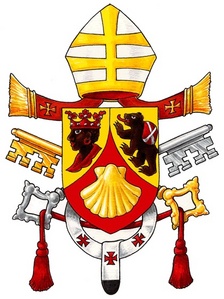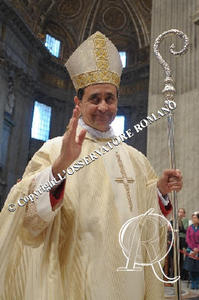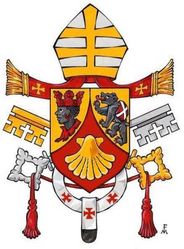The lay –and married– canon lawyer Ed Peters wrote a piece indicating the permanent deacons are to be sexually abstinent (continent) permanently. This is the teaching and law of the Church. Men in studies seeking ordination to the Diaconate, that is, to be a permanent deacon, should have been taught this by the formators but lets concede the fact that those in charge of the diaconate program skipped or mis-represented the Church’s teaching in this matter. It is widely seen, however, to an unenforceable church law. Ed Peters quotes the phrase, “perfect and perpetual” from Canon 277 §1 of the 1983 Code of Canon Law to explain the behavior of the permanent deacon. The first premise is paragraph 1, even with the presence of a possible dispensation seen in paragraph 3. The expectation is that all clerics are sexually continent. Conclusion: all men called to holy orders are expected to refrain from sex! The Catholic Church doesn’t have a double standard, one for priests and one for deacons. For the 15K deacons in the USA: amend your life.
Category: Canon Law (Church Law)
Pope issues new laws to conform Vatican to European financial controls
Toward clarifying the canonical status of Sr. Margaret McBride
Much discussion has surfaced about the excommunicated nun, Sr. Margaret McBride, for assisting in the 2009 abortion at St Joseph’s Hospital, Phoenix, AZ.
Ratzinger’s influence in revising the criminal code of Church law reviewed
La Civiltà
Cattolica, the academic
periodical edited by the Society of Jesus but vetted by the Secretary of State
of His Holiness, will publish Bishop Juan Ignacio Arrieta’s essay, “The Influence
of Cardinal Ratzinger in the Revision of the Canonical Criminal Justice System.”
Bishop Juan Ignacio Arrieta Ochoa de Chinchetru, 59, is Spanish, ordained for the Prelature of the Holy Cross. Arrieta earned a doctorate in civil and canon law and served as Dead of the Faculty of Canon Law at the Pontifical University of the Holy Cross. (Rome) Moreover, he was Dean of the Institute of Canon Law of Saint Pius X (Venice). At the service of the Church, Arrieta was a canon prelate of the Apostolic Penitentiary and legal secretary of the Supreme Tribunal of the Apostolic Signatura. Since 2007, he’s been the Secretary of the Pontifical Council for Legislative Texts and ordained bishop in 2008.
In the coming
weeks, the Pontifical Council for Legislative Texts will distribute to its
Members and Consultors the draft of a document containing suggestions for the
revision of Book VI of the Code of Canon Law, the basis of the Church’s penal
law system. For almost two years a commission of experts in penal law has been
re-examining the text promulgated in 1983, taking into account the needs that
have emerged in subsequent years. The aim is to maintain the general plan and
the existing numbering of the canons, while revising some of the decisions
taken at the time, which with hindsight can be seen to be insufficient.
Continue reading Ratzinger’s influence in revising the criminal code of Church law reviewed
Omnium in Mentem (in English)
On 15 December 2009, Pope Benedict made public some “clarifications” (revisions?) he made to the 1983 Code of Canon Law in a motu proprio titled, Omnium in Mentem. To date, no English translation of the motu proprio has been made available, until now that is.
Motu Proprio: Variations to the Code of Canon Law, canons canons 1008, 1009, 1086, 1117 & 1124 –Omnium in mentem
Vatican
City, 15 December 2009 (VIS) – Made public today was Benedict XVI’s Motu
Proprio, “Omnium in mentem”. The document is dated 26 October 2009
and contains two variations to the Code of Canon Law (CIC), variations which
have long been the object of study by dicasteries of the Roman Curia and by
national episcopal conferences.
The document published today contains five
articles modifying canons 1008, 1009, 1086, 1117 and 1124. According to an
explanatory note by Archbishop Francesco Coccopalmerio, president of the
Pontifical Council for Legislative Texts, these variations “concern two
separate questions: adapting the text of the canons that define the ministerial
function of deacons to the relative text in the Catechism of the Catholic Church (1581), and suppressing a subordinate clause in three canons concerning
marriage, which experience has shown to be inappropriate”.
The variation
to the text of canon 1008 will now limit itself to affirming that “those
who receive the Sacrament of Orders are destined to serve the People of God
with a new and specific title”, while canon 1009 “will be given an
additional third paragraph in which it is specified that the minister
constituted into the Order of the episcopate or the priesthood receives the mission
and power to act in the person of Christ the Head, while deacons receive the
faculty to serve the People of God in the diaconates of the liturgy, of the
Word and of charity”.
Archbishop Coccopalmerio’s note then goes on to
explain that the other changes contained in the Motu Proprio all concern the
elimination of the clause “actus formalis defectionis ab Ecclesia
Catholica” contained in canons 1086 para. 1, 1117 and 1124. This clause,
“following much study, was held to be unnecessary and inappropriate”,
he writes.
“From the time the Code of Canon Law came into effect in the
year 1983 until the moment of the coming into effect of this Motu Proprio,
Catholics who had abandoned the Catholic Church by means of a formal act were
not obliged to follow the canonical form of celebration for the validity of
marriage (canon 1117), nor were they bound by the impediment concerning
marriage to the non-baptised (canon 1086 para. 1), nor did they suffer the
prohibition on marrying non-Catholic Christians (canon 1124). The
abovementioned clause contained in these three canons represented an exception
… to another more general norm of ecclesiastical legislation according to
which all those baptised in the Catholic Church or received into her are bound
to observe ecclesiastical laws (canon 11).
“With the coming into effect of
the new Motu Proprio”, Archbishop Coccopalmerio adds, “canon 11 of
the Code of Canon Law reacquires its full force as concerns the contents of the
canons thus modified, even in cases were there has been a formal abandonment.
Hence, in order to regularise any unions that may have been made in the
non-observance of these rules it will be necessary to have recourse, if
possible, to the ordinary means Canon Law offers for such cases: dispensation
from the impediment, sanation, etc”.
The Latin and Italian texts are here.


